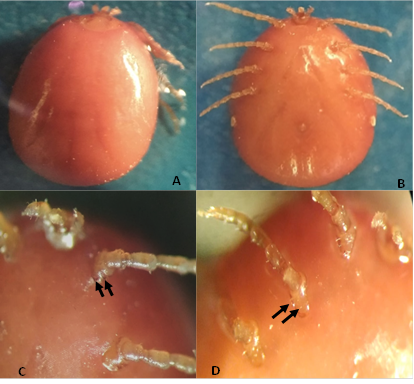Occurrence of Amblyomma rotundatum Koch, 1844 in Epicrates assisi Machado, 1945 in João Pessoa, Paraíba, Brazil
DOI:
https://doi.org/10.21708/avb.2021.15.4.10147Resumen
The Caatinga rainbow boa (Epicrates assisi Machado, 1945) is a snake belonging to the order Squamata, family Boidae, and subfamily Boinae. It has a wide distribution in Brazil and can be found in the Caatinga biome. The present study aims to report the first occurrence of Amblyomma rotundatum in E. assisi in the municipality of João Pessoa, Paraíba State (PB). On March 3, 2020, a tick collection was performed on the dorsal region of the head of an E. assisi, which was captive at the Arruda Câmara Zoobotanical Park, João Pessoa-PB. After collecting the tick, it was transferred to a flask containing 70º alcohol and sent to the Laboratory of Animal Parasitology of the Federal Rural University of the Semi-Arid (UFERSA) for analysis. Identification was done with the aid of a stereomicroscope using a taxonomic key. The result identified this specimen as a nymph of A. rotundatum. The occurrence of this tick species in E. assisi is reported for the first time and constitutes new data applicable to the ectoparasites that occur in this host species in Brazil.
Descargas

Descargas
Publicado
Número
Sección
Licencia
Autores que publicam na Acta Veterinaria Brasilica concordam com os seguintes termos: a) Autores mantém os direitos autorais e concedem à revista o direito de primeira publicação, com o trabalho simultaneamente licenciado sob a Licença Creative Commons Attribution que permite o compartilhamento do trabalho com reconhecimento da autoria e publicação inicial nesta revista. b) Autores têm autorização para assumir contratos adicionais separadamente, para distribuição não-exclusiva da versão do trabalho publicada nesta revista (ex.: publicar em repositório institucional ou como capítulo de livro), com reconhecimento de autoria e publicação inicial nesta revista. c) Autores têm permissão e são estimulados a publicar e distribuir seu trabalho online (ex.: em repositórios institucionais ou na sua página pessoal) a qualquer ponto antes ou durante o processo editorial, já que isso pode gerar alterações produtivas, bem como aumentar o impacto e a citação do trabalho publicado (Veja O Efeito do Acesso Livre).


 Esta obra está licenciada com uma Licença
Esta obra está licenciada com uma Licença 